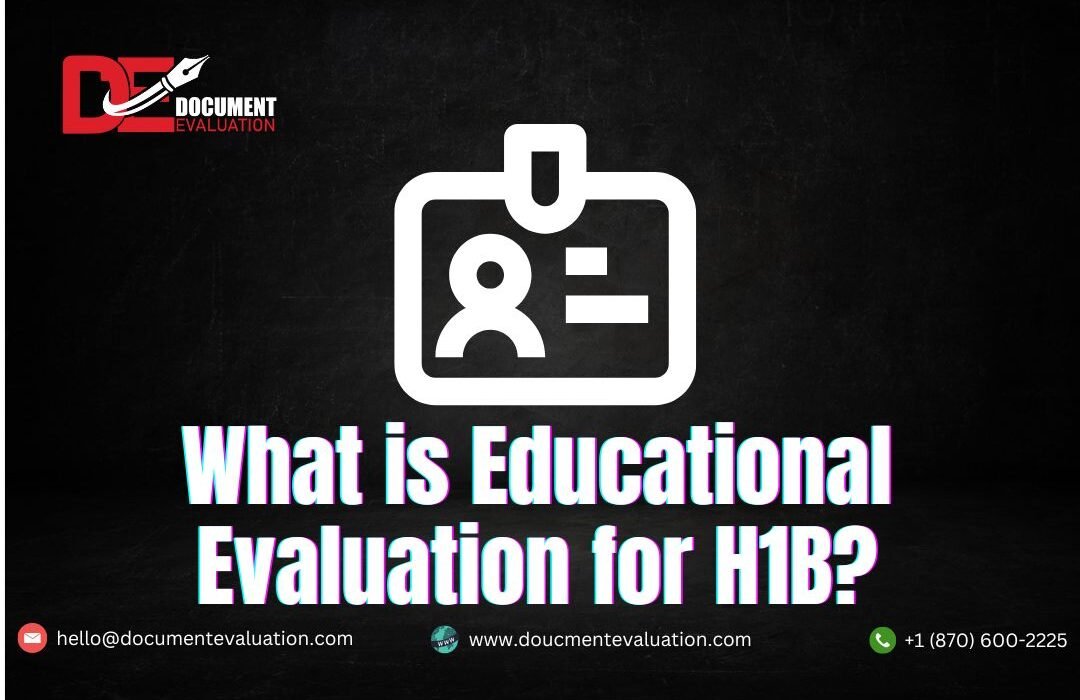What is Educational Evaluation for H1B?
The H1B visa is one of the most sought-after work visas in the United States, allowing highly skilled foreign professionals to work for U.S. companies. However, one crucial aspect of the H1B petition process is educational evaluation—a process that determines whether a foreign degree is equivalent to a U.S. degree. Understanding this education evaluation for h1b is essential for applicants, especially those who need to meet USCIS requirements or respond to an RFE (Request for Evidence).
Why is Educational Evaluation Required for H1B?
The United States Citizenship and Immigration Services (USCIS) requires educational evaluations to ensure that foreign applicants meet the degree qualifications for their respective H1B job positions. Since academic systems differ worldwide, a foreign degree may not always align directly with U.S. educational standards. An educational evaluation helps verify equivalency and supports a successful H1B petition.
How Does Educational Evaluation Work?
The process of educational evaluation for H1B involves analyzing the foreign degree and comparing it to a U.S. degree in terms of coursework, credit hours, and field of study. This is typically done by foreign credential evaluation agencies specializing in academic assessments.
The evaluation may include:
- Course-by-course evaluation – A detailed analysis of individual courses to determine credit equivalency.
- Document-by-document evaluation – A general comparison of the foreign degree with a U.S. degree.
- Work experience evaluation – If the applicant lacks a direct degree equivalency, their work experience may be assessed as an alternative qualification (3 years of relevant work experience may be considered equivalent to 1 year of formal education).
What is RFE Meaning in H1B Visa Applications?
An RFE (Request for Evidence) is issued by USCIS when additional information is needed to determine an applicant’s eligibility. One common reason for receiving an USCIS request for initial evidence is a lack of sufficient proof regarding educational credentials. If an H1B petitioner’s degree is not automatically recognized as equivalent to a U.S. degree, USCIS may request an educational evaluation to confirm qualifications.
How to Respond to an RFE for Educational Evaluation?
If request for initial evidence is issued due to degree-related concerns, the petitioner should take the following steps:
- Obtain an educational evaluation from a recognized credential evaluation agency.
- Ensure the evaluation matches the job requirements—for example, if the H1B job requires a Bachelor’s degree in Computer Science, the evaluation must confirm that the foreign degree is equivalent to a U.S. Bachelor’s in Computer Science.
- Include supporting documents, such as course descriptions, syllabi, and work experience letters if needed.
- Submit the response within the deadline specified in the RFE notice.
Choosing the Best Foreign Degree Evaluation in USA
Selecting the right credential evaluation service is critical to ensuring a smooth H1B petition process. The best credential evaluation agencies are:
- Recognized by USCIS and immigration attorneys.
- Accredited members of NAFSA orTAICEP, the leading credential evaluation organizations in the U.S.
- Experienced in handling H1B evaluations and RFE responses.
- Capable of providing work experience evaluations if necessary.
One of the best foreign degree evaluation in USA services is Document Evaluation, a reliable provider that ensures foreign degrees meet USCIS standards. They specialize in academic evaluations, work experience evaluations, and expert opinion letters for H1B applicants.
Conclusion
Educational evaluation plays a vital role in securing an H1B visa, ensuring that foreign degrees meet U.S. standards. If an applicant receives an USCIS request for initial evidence (RFE) regarding their degree, obtaining a credible educational evaluation is essential. Choosing a best credential evaluation service like Document Evaluation can significantly improve the chances of an H1B approval. Proper preparation and selecting the right agency can make the process seamless and successful.








